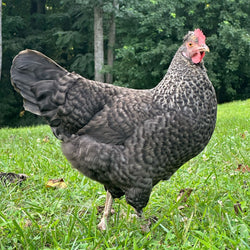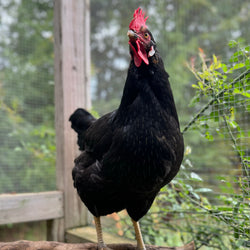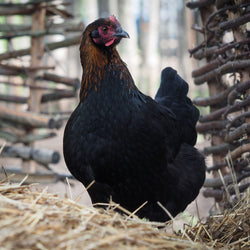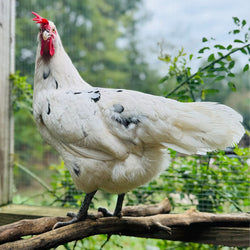f=menu&page=10/--
Frequently Asked Questions
Here we answer the most commonly-asked questions about ordering, chicken care, and more.
Could my baby chicks really drown in their waterer or water dish?
It seems like a strange question... but the answer is YES. Baby chicks can actually drown in a waterer, particularly if it is larger and designed for adult chickens, and particularly if the chick is very young and hasn't developed good coordination, yet, or if the chick is ill or weak. What happens is that a chick can jump into the water trough to drink, and then find the sides too high or slippery to get out. And even if the chick has not jumped into the waterer, baby chicks---like other babies---can sometimes just fall asleep where they stand. If...
Read MoreWhat is good chicken coop flooring?
Good flooring. You might hear that term a lot when you're getting set up for baby chicks or chickens: get good chicken coop flooring! And "Of course!" you think. "I want to use good flooring for my flock of chickens." But what exactly does that entail? Essentially, chickens need solid flooring with some traction, ideally with access to the ground so they can forage. What flooring NOT to use Wire coop flooring is bad for a few reasons. It can seem attractive, because it lets droppings pass right through. But adult birds are relatively heavy, and wire is hard on...
Read MoreMy chicken has frostbite. How do I help them?
Frostbite on chickens usually affects the comb, wattle, and feet. Read below to learn how to treat your chicken, and how to make sure your coop is set up properly with adequate ventilation. Frostbite occurs when the body becomes very cold and sends a signal to constrict blood vessels in the extremities in order to direct more blood to vital organs. Because the flow of blood and oxygen to the affected parts of the body--such as the comb, wattles, and feet--is disrupted, the tissue may eventually freeze. Frostbite may cause minor damage to just the tips of the comb, wattles,...
Read MoreWhat are the best ways to prevent impacted crop, impacted gizzard, and sour crop in my chickens?
Impacted crop occurs when there is a blockage in your chicken's digestive tract, preventing food from traversing her system. Occasionally you may actually have a blockage further down, like an impacted gizzard. Sour crop---a bacterial overgrowth in her crop, typically an overgrowth of yeast---can occur when the digestive system is stalled with an impaction, but can also happen on its own if there's a pH imbalance, or if your chicken is eating rotten or moldy food. There are a few good strategies you can use to prevent impacted crop and sour crop in your flock. Feeding Feed fresh, good quality...
Read MoreWhat is vent gleet and how can I treat my chickens that have it?
In baby chicks, pasty butt (a.k.a. pasted vent) occurs when poo dries in the chick's vent (her pooper) and the blockage prevents her from defecating. This is a critical situation for a baby chick and should be addressed immediately because it can be fatal. By the time your bird is an adult layer, her muscles are pretty well developed for expulsion, and the vent can expand significantly (large enough to pass an egg, right?). So, adult hens seldom (perhaps never!) suffer from pasty butt. That said, they can certainly get vent feathers messy with loose poo, and that can...
Read MoreWhen should I take my pet chicken to the vet?
As keepers of pet chickens, we've all been there. You notice one of your birds exhibiting some unusual behaviors or symptoms, and you're faced with a dilemma: What do you do? What is causing the symptoms and how can you help? Is what you're seeing normal chicken behavior, a minor issue that may resolve itself, or serious problem that warrants a professional help? Let's be honest: You don't want to pay a big vet bill only to find out it's nothing serious, but you also don't want to assume it's nothing serious and have it turn out to be something...
Read MoreWhich chicken breeds may need extra heat in winter?
Chickens are incredibly adaptable! They are kept all over the world in all kinds of extreme climates. But it's no secret that some breeds are hardier in cold weather than others. Some breeds were not developed for cold-hardiness or have characteristics that make them more susceptible to cold than others. In a well-ventilated but not drafty coop, most chickens can stay warm by fluffing up their feathers to trap a layer of warm air against their bodies--as long as they are not wet and or exposed to a draft. Drafts can remove that "jacket" of warmer air surrounding the bird....
Read MoreWhat kind and how much feed should I give my flock at each stage of development?
As baby chicks and waterfowl grow, their nutritional needs change. It can be confusing to know how much and what kind of feed to give them at each stage of development. Please don't lose sleep over this issue! We have all the help you need for your growing chickens, ducks, and geese right here. One note before we get started: All feed manufacturers have recommended stages for their feed. This guide is a commonly accepted standard; however, you should follow the directions on the feed you choose for optimum benefit from that brand. Regardless of their age, one principle always...
Read More







"The Clubhouse" Coop
Easy to assemble and built to last, the Clubhouse Coop is the perfect starter coop for a small flock.











